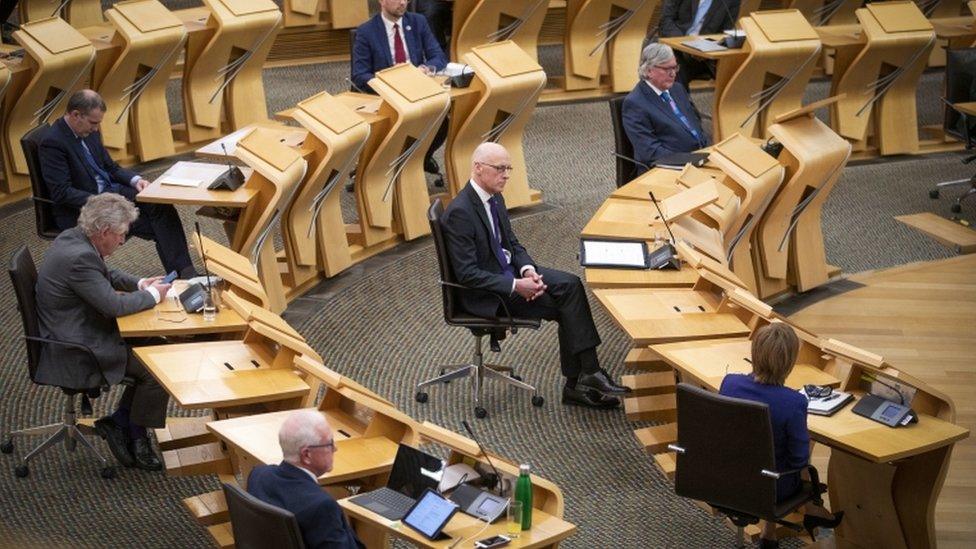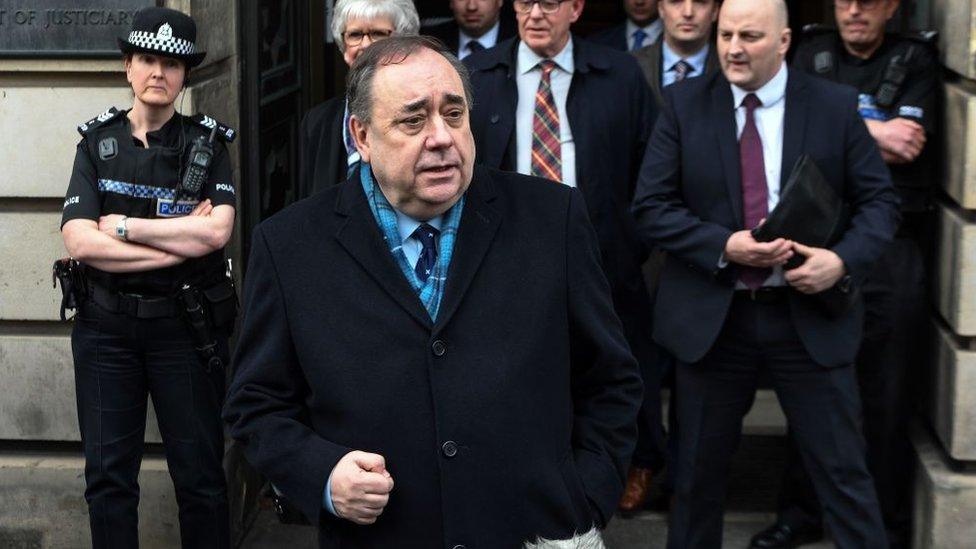John Swinney survives vote of no confidence at Holyrood
- Published

This was the second time John Swinney has survived a vote of no confidence in the past year
Deputy First Minister John Swinney has survived a vote of no confidence at Holyrood after MSPs rejected the motion by 65 to 57.
The vote was tabled by the Tories after a row over the government providing its legal advice to an inquiry committee.
The motion was voted down after the Greens sided with the SNP to dismiss the move as a political stunt.
Mr Swinney had agreed to publish "key" papers from the government's legal battle with Alex Salmond.
However, the committee said it was "not reassured" that it had been given access to all the material it had asked for.
Scottish Conservative group leader Ruth Davidson said the "key legal advice the deputy first minister promised has not been provided". Her party was backed by Labour and the Lib Dems.
Mr Swinney described the motion as "entirely baseless".
The row stems from the government's handling of harassment complaints against Mr Salmond, which it admitted had been unlawful after the former first minister launched a judicial review case at the Court of Session.
A special parliamentary committee was set up to hold an inquiry into the affair. Members of the group asked for government legal advice relating to the case to be disclosed.
MSPs - including the Greens - twice voted to underline this demand, but the government initially only provided access to a memo summarising some advice.
After all opposition parties said they would back a vote of no confidence in Mr Swinney if the papers were not handed over, he relented and the government published a series of documents.
However the committee said it was "frustrated" by how the process had played out and the Tories pushed ahead with the confidence vote.

Mr Salmond was cleared of charges of sexual assault after a separate High Court trial in March of last year
Ms Davidson told MSPs that the committee had been "hampered at every turn from receiving even basic information".
She said the papers published contained "damning revelations", but argued that "there still remain key omissions".
She added: "We know we won't win - the votes are there for the deputy first minister - but we believe it is important and right to put on record that this is no way for the government to treat this parliament."
Labour's Jackie Baillie - a member of the inquiry committee - said it had been provided with "partial information, delayed information and in some cases no information at all".
She added: "There is a pattern of behaviour here of obstruction, secrecy and contempt for the institution of this parliament."
Lib Dem MSP Alex-Cole Hamilton added that it was "entirely due to the obstruction and sleight of hand employed by this administration that we have arrived at this point".
'Political theatre'
Mr Swinney contended that the government had published the advice to counter "outlandish allegations" of conspiracy, and had provided everything the committee had asked for.
He said: "We have taken the extraordinary and unprecedented step of publishing formal legal advice of the kind that no previous government in Scotland has done.
"On any fair interpretation of what the government has done, the Tories' pursuit of this motion today is now entirely baseless.
"With an election only weeks away, the reality is, I suspect, that they were always intent on pushing this motion to a vote regardless of what action the government has taken."
He was backed by Patrick Harvie, who said the inquiry had "descended into political farce".
The Green co-leader said the process had become "shabby political theatre", with opposition members chiefly interested in "winning a political scalp".
The vote is the second time in the past year Mr Swinney has survived a confidence motion, with the Greens also backing him in his post as education secretary in a row over exam results.